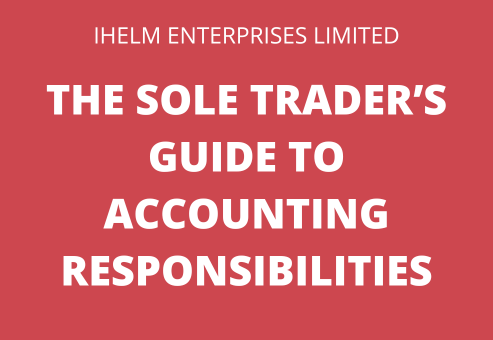During October’s Facebook Live, I talked about the responsibilities that sole traders in the UK have regarding their accounts.
Starting a business as a sole trader in the United Kingdom can be an exciting endeavour. Whether you’re offering your expertise as a consultant, running an online store, or providing any other goods or services, understanding your accounting responsibilities is crucial for the success of your business. In this blog post, we’ll explore the essential accounting responsibilities that sole traders must adhere to in the UK.
1. Registering as a Sole Trader
Before diving into your accounting responsibilities, you’ll need to register as a sole trader with HM Revenue and Customs (HMRC). This is a legal requirement, and you must do this as soon as you start trading. You can register online through the HMRC website, and you’ll receive a Unique Taxpayer Reference (UTR) and may be required to register for the Self-Assessment tax system.
2. Keeping Accurate Records
Maintaining accurate financial records is a fundamental responsibility for any sole trader. This involves tracking all income, expenses, and business transactions. You should keep records of:
– Sales and income: Maintain a record of all sales, invoices, and receipts. This includes both cash and digital payments.
– Expenses: Keep receipts for all business-related expenses, such as office supplies, equipment, travel costs, and any other expenditures directly related to your business.
– Bank statements: Regularly reconcile your bank statements with your business records to ensure accuracy.
3. Setting Aside Funds for Taxes
As a sole trader, you are personally responsible for paying your taxes, including income tax and National Insurance contributions. To avoid any surprises, it’s essential to set aside a portion of your earnings for these tax obligations. HMRC may also require you to make Payments on Account, which are advance payments towards your tax bill, usually due twice a year.
4. Completing Self-Assessment Tax Returns
Sole traders in the UK are required to file Self-Assessment tax returns each year. This involves reporting your income, expenses, and profits to HMRC. The deadline for submitting your tax return is typically January 31st for the previous tax year. It’s essential to file your tax return on time to avoid penalties and interest charges.
5. VAT (Value Added Tax) Registration
Depending on your annual turnover, you may need to register for VAT. If your turnover exceeds the VAT threshold (which can change annually), you must charge VAT on your sales and file regular VAT returns. Keeping accurate VAT records and complying with VAT regulations is crucial to avoid penalties.
6. National Insurance Contributions (NICs)
Sole traders also need to pay Class 2 and Class 4 National Insurance contributions. These contributions are based on your profits and help you access certain state benefits, including the state pension. Keeping track of your income and profits is essential for calculating your NICs accurately.
7. Seeking Professional Help
While it’s possible to handle your accounting responsibilities as a sole trader on your own, many find it beneficial to seek the assistance of an accountant or tax advisor. A professional can help you navigate complex tax regulations, optimize your tax liability, and ensure compliance with all legal requirements.
Being a sole trader in the UK comes with specific accounting responsibilities that should not be taken lightly. Keeping accurate records, filing tax returns, and meeting your tax obligations are essential for the financial health and legal compliance of your business. By staying organized and seeking professional guidance when needed, you can successfully manage your accounting responsibilities and focus on growing your business. Remember, compliance is key to a thriving sole trader business in the UK.
If you have any questions about the responsibilities a sole trader has regarding their accounts, please feel free to e-mail me.

